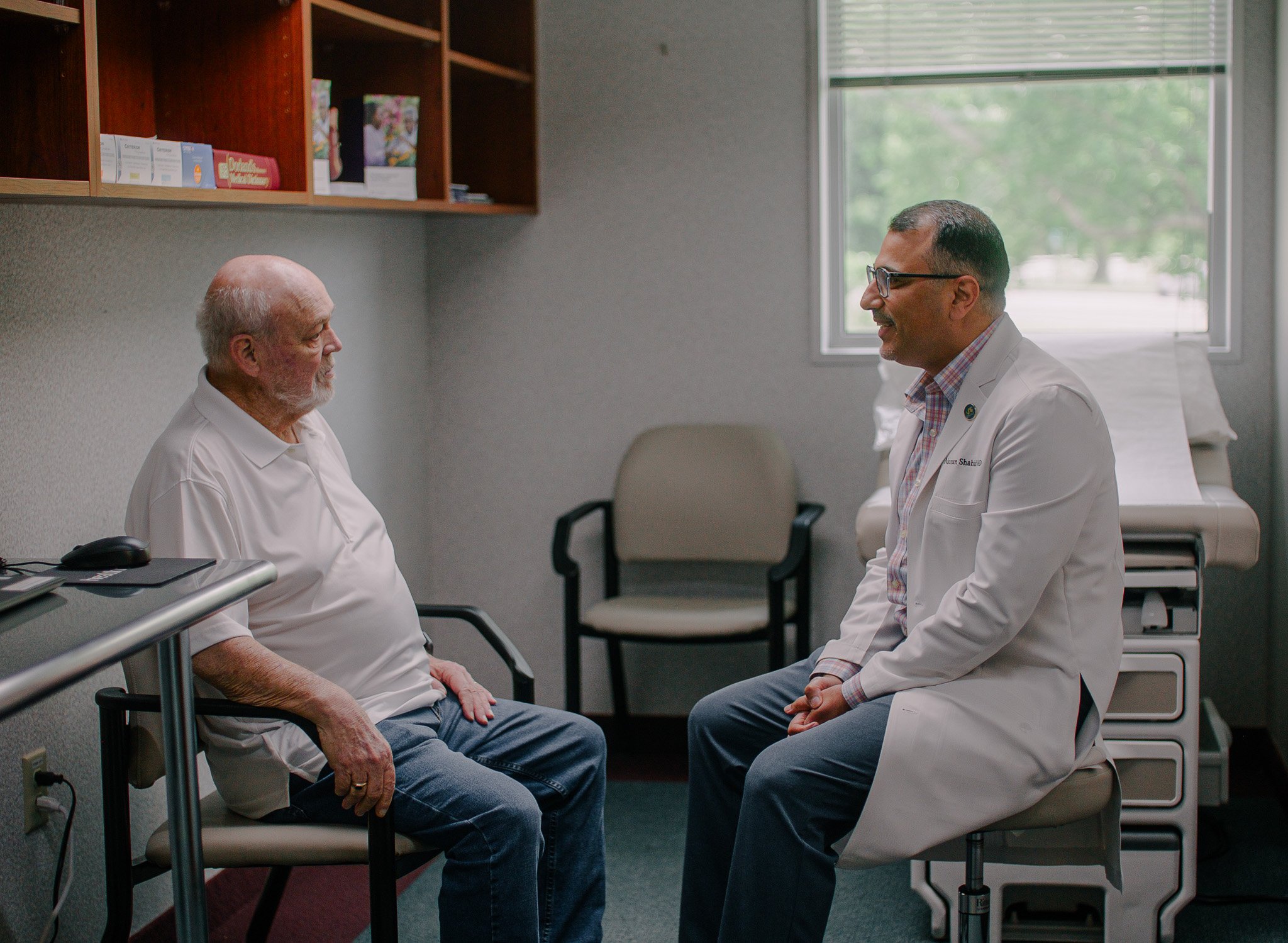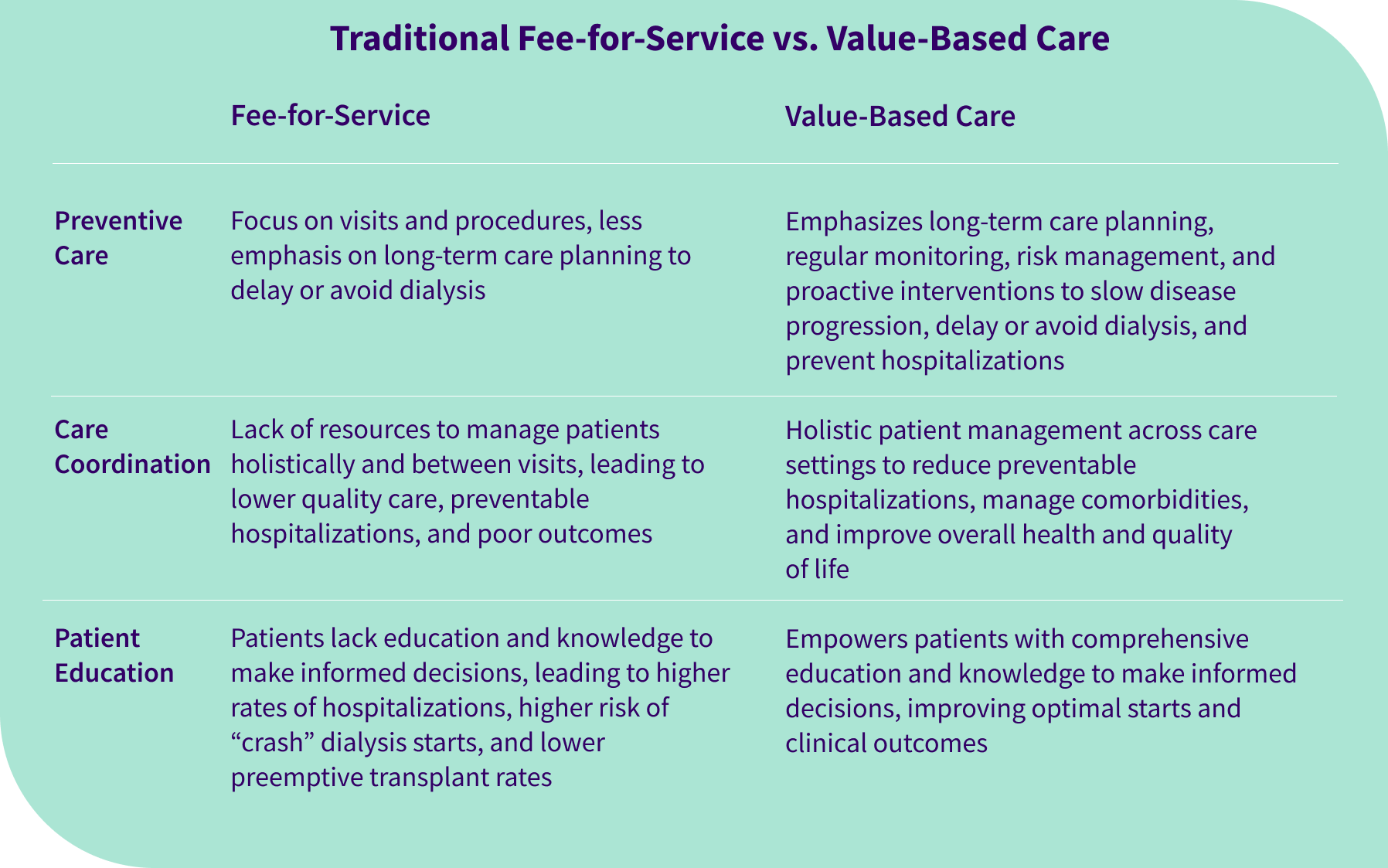At Eastern Nephrology Associates, Value-Based Care Delivers Results that Matter
In partnership with Interwell Health, Eastern Nephrology transformed patient outcomes by embracing a value-based care approach, achieving an 85 percent optimal dialysis start rate, a nearly five-fold increase in preemptive transplant referrals, and leading scores in the government’s value-based kidney care model.
tags

Eastern Nephrology Associates, a prominent nephrology practice caring for patients across eastern North Carolina and northeastern South Carolina, has been at the forefront of providing exceptional kidney care for 50 years. The practice’s vision is “helping kidney patients live well”—a vision the leadership team realized they could fulfill more effectively by adopting a value-based approach that holistically addresses patients’ needs.
“Traditional nephrology care focuses on the number of visits a patient may have, medications, testing, ordering procedures,” said Dr. Heather Jones, a nephrologist at Eastern Nephrology. “Value-based care focuses on what’s going to make the most difference in improving a patient’s quality of life, inside and outside of what happens during medical appointments.”

An opportunity to provide more coordinated, patient-centered care
The leadership team at Eastern Nephrology recognized that successfully embracing value-based care would require the practice to make significant updates to its clinical workflows, administrative processes, and data analytics capabilities. Rather than trying to establish new resources and expertise on its own, Eastern Nephrology decided to find a value-based care partner.
For Dr. Nauman Shahid, an Eastern Nephrology nephrologist who spearheads the practice’s value-based care efforts, it was an easy decision to partner with Interwell Health. “Interwell has the expertise, experience, and resources to make it the premier partner in value-based care. For us, Interwell was the right choice at the time and is still the best choice,” said Dr. Shahid.
Eastern Nephrology’s partnership with Interwell has driven significant outcomes across multiple care dimensions, including:
- 85 percent of patients start dialysis optimally (e.g., with a permanent AV fistula or graft in place rather than with an emergency catheter)
- 40 percent of patients start dialysis at home
- Nearly 5x higher preemptive transplant referral rate, from 85 to almost 400 per year
- Top performer in the government’s value-based Kidney Care Choices (KCC) Model1
- 100 percent Total Quality Score in first year of the Model
- 86 percent of patients screened for depression in the first year
The secret sauce for building a successful value-based kidney care program
Leveraging its unique kidney care model, Interwell provided a comprehensive framework to enable Eastern Nephrology’s successful value-based care program. The partnership includes the following core components:
- Seamless care coordination
- Dedicated patient education
- Built-for-purpose technology
- Advanced data analytics
At the beginning of the partnership, Interwell embedded renal care coordinators (RCCs) in Eastern Nephrology offices to provide patients with enhanced support and education. Care coordinators such as Kathy Galloway, an Interwell registered nurse with more than 25 years of experience, ensure patients feel supported through every step of their treatment. “We want to gain patients’ trust so they feel comfortable coming to us,” said Galloway. “We also work with the doctors and APPs, the office staff, and our vascular office to keep everyone on track.”
Prior to establishing a value-based care program with Interwell, Eastern Nephrology did not have a renal care coordinator position. “Looking back on it, I can't really imagine how we managed patient education and engagement without them. The renal care coordinator makes sure the patient has somebody in their corner advocating for them,” said Dr. Jones.
One of the most important roles of the care coordination team is bridging the gap between patients’ office visits to make sure nothing is missed. “When patients leave our office, a lot can materialize before the next time they're back,” said Dr. Shahid. “Our partnership with Interwell and their expert care coordination team has helped a lot of our patients do better during that key time.”
Interwell also worked with Eastern Nephrology to enhance patient education with Interwell Learning, a kidney disease education program that includes patient-friendly videos and take-home print materials. The goal of the program is to help patients better understand their diagnosis and treatment options so they can become more active participants in their care.
“Before, practices never had access to a structured way of delivering patient education,” said Dr. Shahid. “Our access to Interwell gives us the ability to do education in a more regimented way. Interwell Learning helps our patients learn about the basics of kidney disease and eventually make decisions that are best for their health.”
Chronic kidney disease (CKD) education is especially important to help prepare patients for a kidney transplant or to start dialysis. “It can be really overwhelming,” said Dr. Jones. “There are a lot of options for how patients can live with end-stage kidney disease and, depending on which option a patient chooses, there are multiple steps to be prepared. Having a platform where a patient can watch a video, read some material, take some quizzes, and then take that information home to their families is a great tool for us to share with our patients.”
Another tool Eastern Nephrology relies on to implement value-based care is Acumen Epic Connect, a nephrology specific electronic health record (EHR) system that is widely adopted by nephrology practices to enhance data collection, risk stratification, and care team communication.
“Acumen has been an important factor in our success with value-based care,” said Dr. Shahid. “When you are with the patient, all your focus is on that patient. When you come out of that room, zooming out to make decisions for your collective group of patients is important. With Acumen, I can figure out where I need to focus and where care gaps exist.”
Acumen also enables Eastern Nephrology clinicians to view patients referred to transplant centers, surgeons, or other specialists not affiliated with their practice. “Having Acumen really helps us keep everybody in the loop on what's going on with each patient,” said Dr. Jones. “It's not just about the patient and the nephrologist relationship. It's also our front office staff, our renal care coordinators, our clinical staff, our advanced practitioners. Having an electronic health record that is specifically designed to help all of us work together in chronic kidney disease has been very valuable.”
As part of the value-based care partnership, Interwell provides robust analytics to identify care gaps, monitor high-risk patients, and prioritize interventions to reduce preventable complications. “So many of our patients have multiple, complex medical diseases. Partnering with Interwell helps us capture that data so that we're able to integrate kidney care with the other aspects of their care and think about the patient more holistically,” said Dr. Jones
Using predictive analytics, Interwell also helps Eastern Nephrology identify patients who are at high-risk of disease progression and hospitalizations and intervene proactively. “Physicians are not traditionally trained to analyze data. Having access to Interwell’s skilled data analytics team helps us identify those areas which were not visible to us,” said Dr. Shahid.
“Outcomes we were not able to achieve in a fee-for-service model”
“A lot of physicians ask about our experience with value-based care and what are some of the successes that we have noticed. It's not hard to count them.” – Dr. Nauman Shahid
“When I look at our journey into value-based care, I see a lot more of our patients starting dialysis optimally, preferably at home, compared to five or 10 years ago. I see our patients with kidney disease living longer and not progressing to dialysis because of the care coordination, education, and choices they're now able to make,” said Dr. Shahid. “I see a lot of outcomes we were not able to achieve in a fee-for-service model that we are able to achieve now.”
Preemptive transplant has been a particularly exciting area of growth. “In the past few years, a very high proportion of our patients have been referred and listed for kidney transplant compared to years before, and we have started to see many of them get transplanted even before they get on dialysis,” said Dr. Jones. “It's so satisfying to see patients who didn't realize how sick they were feel better and get back to normal. I love to hear, ‘My dad got to come to my band concert,’ or ‘I got to go see my grandkid play baseball.’”
“As a clinician who spent most of my time managing the complexities and complications of dialysis for my patients, there's nothing more fulfilling than to see a patient avoiding dialysis altogether by getting a preemptive kidney transplantation without ever stepping a foot in the dialysis unit,” added Dr. Shahid.
A patient success story: Charlie’s journey to transplant
Charlie was first enrolled in Eastern Nephrology’s value-based care program in 2022. Recognizing the urgency of his condition, Kathy Galloway and the renal care team prioritized education on diet and preemptive transplant options. “Kathy worked with me constantly,” Charlie recalls. “She set up everything and followed through on what Dr. Shahid was doing. She even helped arrange a visit to a dialysis clinic to learn more about treatment options; although by then, I hoped to avoid dialysis altogether.”
“Like many other patients, Charlie was suffering from complications due to his chronic health problems. The goal was to try to slow the progression of his kidney disease to buy him more time to get him transplanted,” said Dr. Shahid. “Through our partnership with Interwell, Charlie was able to very quickly navigate this complex world, get referred for a kidney transplant evaluation, and listed for a kidney transplant. Eventually he had a kidney transplant, before he ever needed to start dialysis.”
Read how Charlie rekindled his love of dancing after a preemptive transplant
The future of kidney care
Eastern Nephrology’s success underscores the impact of value-based care when paired with a dedicated, innovative partner like Interwell.
“Adopting value-based care is a process, but it's a process that is worth starting because you can see the rate of optimal starts going up,” said Dr. Shahid. “One of the benefits of value-based care is to prevent complications—and the costs associated with these complications—so you can apply resources elsewhere, such as providing education earlier. Kidney disease is the type of chronic condition where the earlier you intervene, the better the outcomes.”
Curious how you can unlock better outcomes for your patients through value-based care?
Discover how comprehensive care solutions can elevate your nephrology practice on our website.
______________________________________________________________________________
1. CMS: KCC PY 2022 Reconciliation Data Results and Data Dictionary. kcc-model-py22-recon-data.xlsx